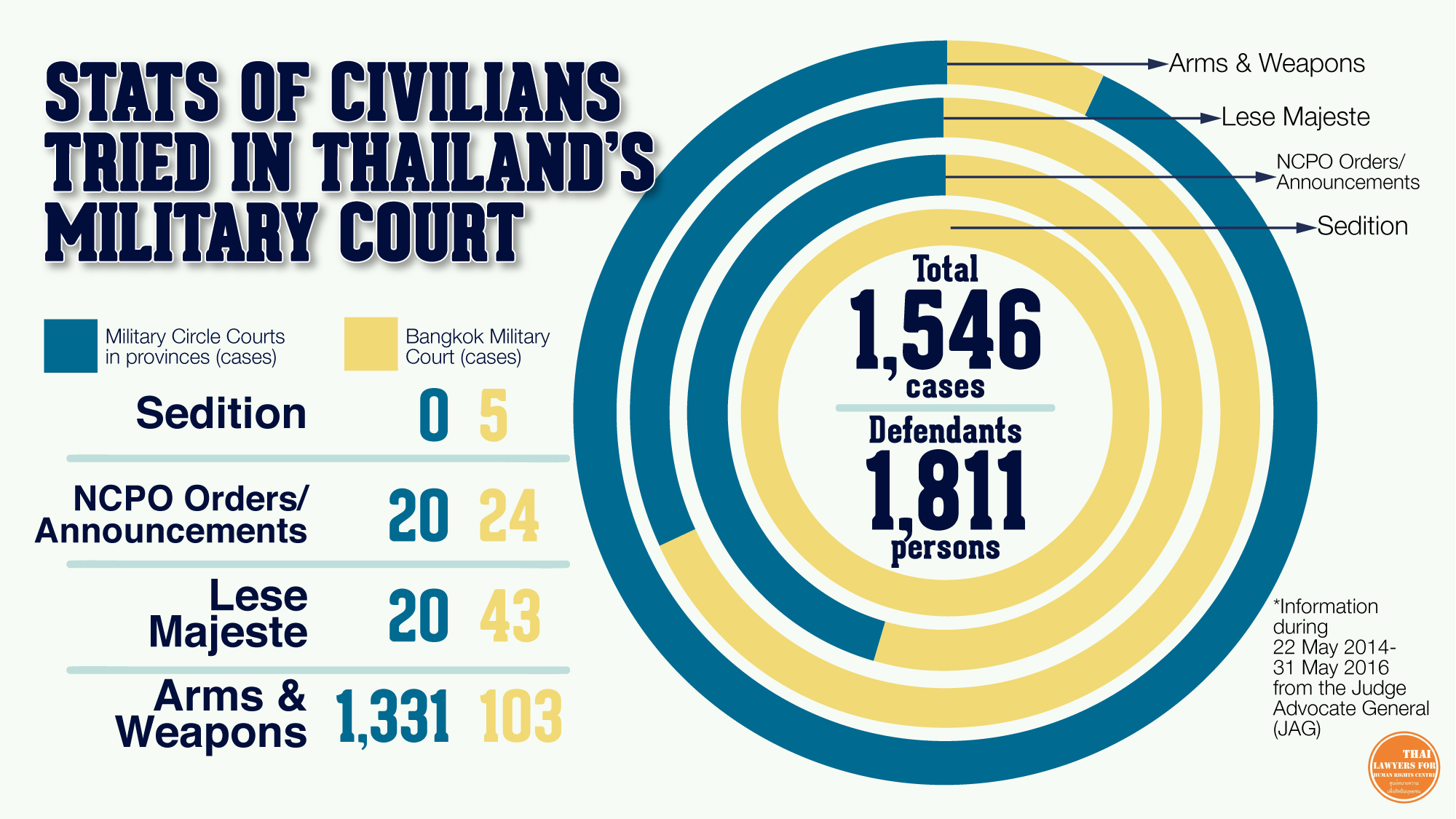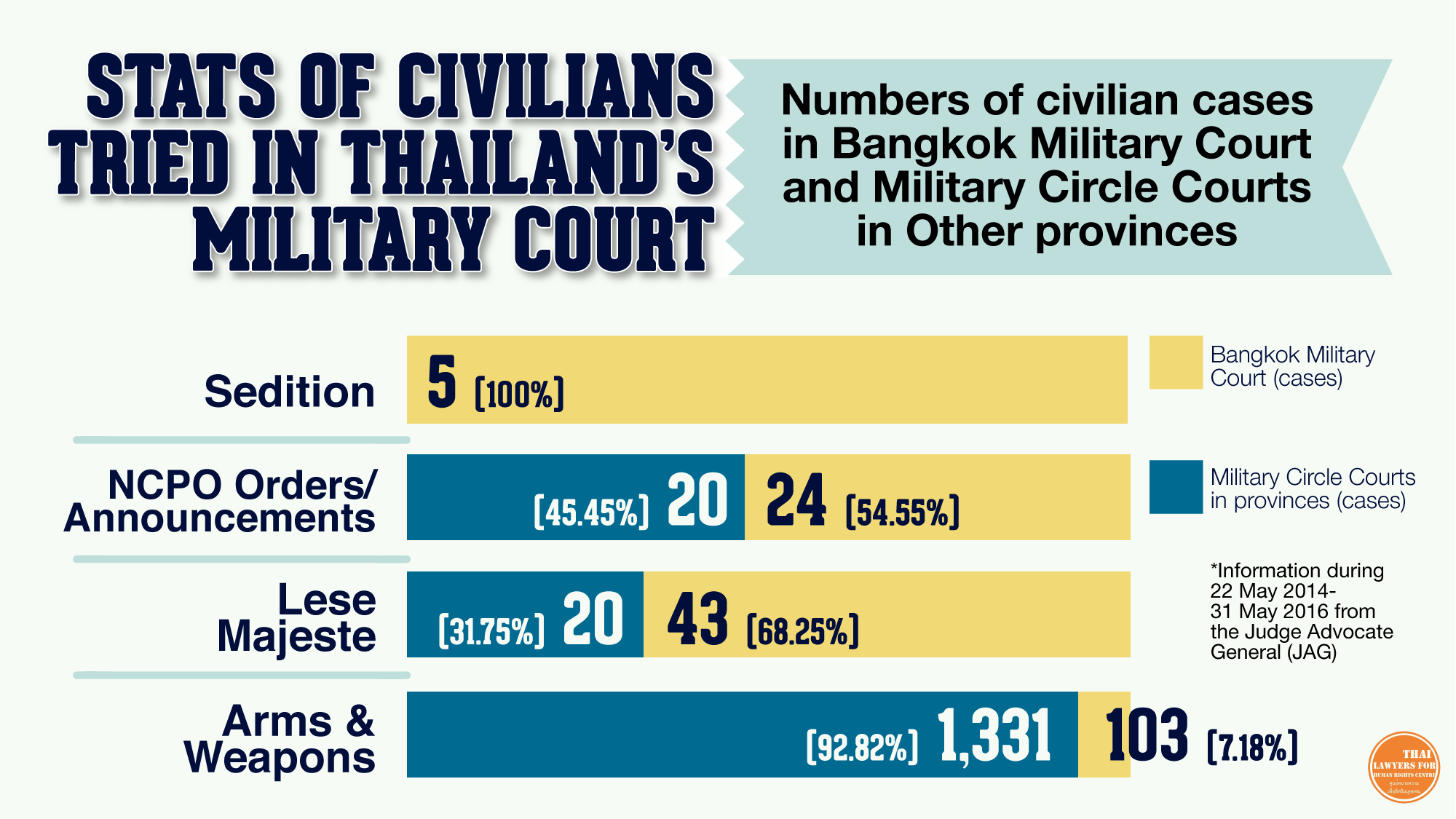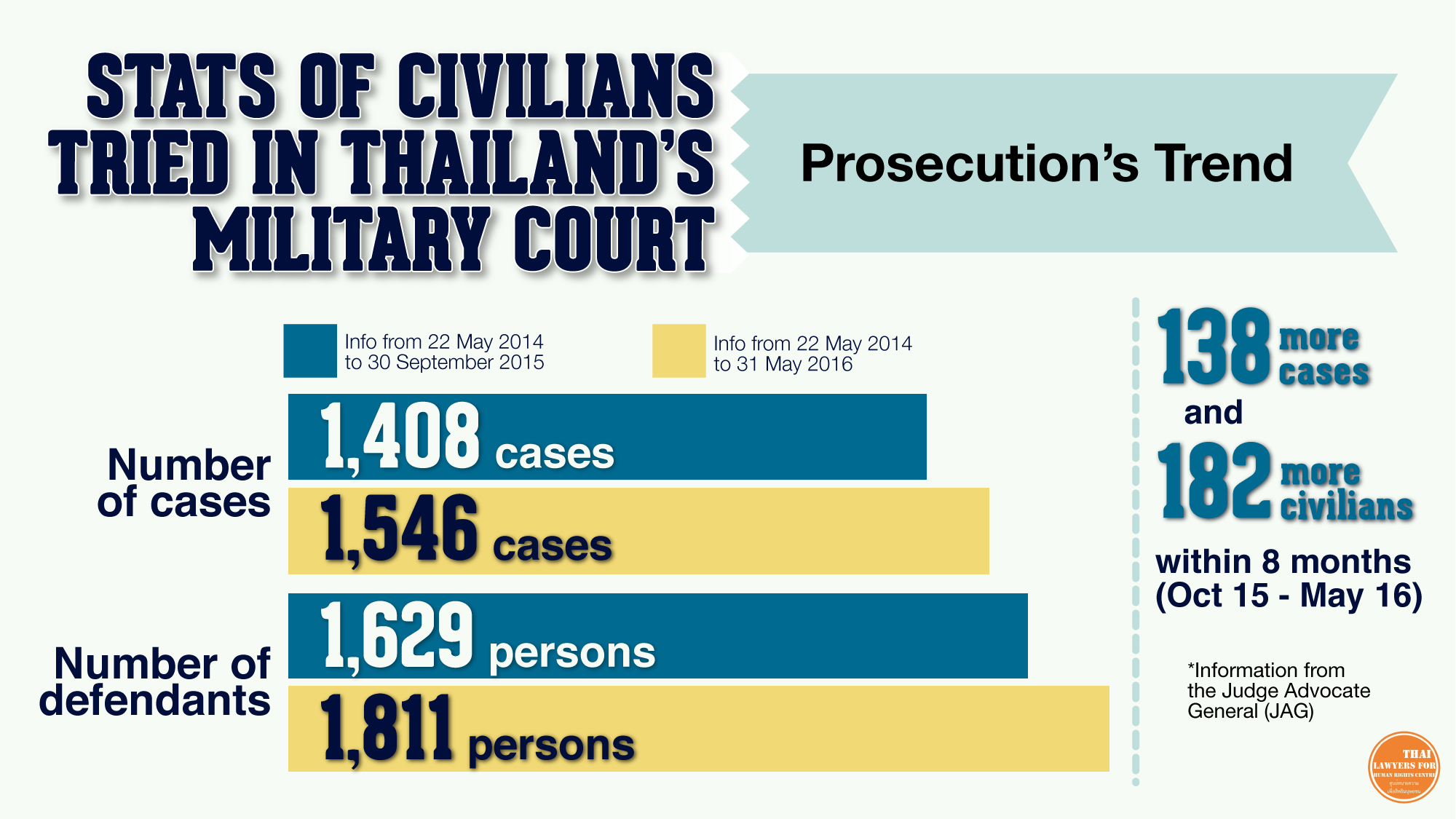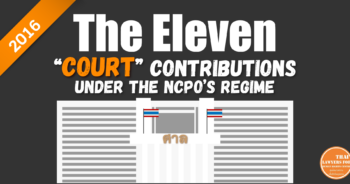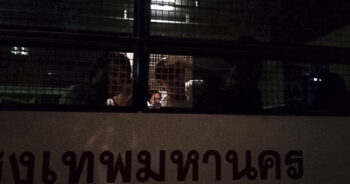Extension of military court jurisdiction over civilians
After the coup d’état on 22 May 2014, the National Council for Peace and Order (NCPO) issued NCPO Announcement No. 37/2014 about offences under the jurisdiction of military courts, NCPO Announcement No. 38/2014 about offences consisting of several connected acts under the jurisdiction of military courts, and NCPO Announcement No. 50/2014 about weapons of war crimes under the jurisdiction of military courts. These Announcements resulted in the extension of the jurisdiction of military courts to try civilians in certain offences including:
- Offences against the King, the Queen, the Heir-Apparent, or the Regent (Article 107 – 112 of Criminal Code)
- Offences against internal national security (Article 113 – 118 of Criminal Code)
- Offences against the Announcements or Orders of the NCPO
- Offences related to use or possession of firearm, ammunitions, or explosives without the permission of the registrar (offences against the Act on Controlling Firearms, Ammunition, Explosives, Fireworks and Imitation of Firearms 1947, committed from 22 May 2014 onward)
- Cases consisting of several acts related to the above offences which are under the jurisdiction of military
Civilians being tried in military court
According to information received from the Judge Advocate General’s Department (JAG) on 12 July 2016, 1,811 civilians have been tried in the Military Court in 1,546 cases from 22 May 2014 to 31 May 2016.
There are 517 pending cases in military courts and 1,029 have reached their final verdicts. 44 cases are concerned with the violation of NCPO Orders and Announcements (such as failures to report to NCPO summons and the ban on political gathering). There are 63 cases prosecuted for defamation of the monarchy, or lese majeste, under Section 112 of the Criminal Code, and 5 cases of sedition-like offences under Section 116 of the Criminal Code. 1,434 cases are offences related to weapons and arms.
Under the Bangkok Military Court’s jurisdiction, there have been 175 cases with 275 civilian defendants. The types and numbers of cases which have been tried in the Bangkok Military Court are as follows:
In other provinces, 1,536 civilians have been tried or are still being tried in 1,371 cases at Military Circle Courts, which could be broken down in details as follows:
TLHR’s observations on the statistics of civilians being tried in military provided by the JAG
- On 1 April 2015, nearly a year after imposing martial law nationwide, the NCPO lifted Martial Law from most provinces in Thailand. The imposition of Martial Law has affected the fair trial rights of those prosecuted in military courts. There is no right of appeal for any crimes that were committed whilst Martial Law was in place, including appeals against conviction and bail refusals.
- The JAG’s statistical information of cases and civilians prosecuted in military courts does not distinguish between cases tried during the period of Martial Law and cases tried after Martial Law was lifted. It is unknown to the public how many civilians and cases could not appeal military courts’ orders or convictions to higher courts.
- According to the JAG’s information, in both Bangkok and other provinces, the offences most brought to trial in military courts are those against the Act on Controlling Firearms, Ammunition, Explosives, Fireworks and Imitation of Firearms 1947. The heaviest sentence for these offences is capital punishment. The thousands of accused and defendants in this category demonstrate that common criminal offences, not related to political activities or motives, have been processed in military courts that compromise their fair trial rights. In addition, the JAG’s information does not specify what types of arms or weapons were possessed by the accused. TLHR has found that defendants in many weapons cases tried in the military courts were villagers or people of ethnic groups arrested for possessing unregistered cap guns or for not handing over the firearms to the authorities as ordered by an NCPO announcement. The alleged offenders usually use the guns for hunting or taking care of their plantations. Some possessed only one gun or antique firearms with no registration. Many alleged offenders are not involved with politics or violence in any way.
- The TLHR finds some inconsistencies and inaccuracies in the JAG’s recent information when compared with prior information accurate as of 30 September 2015. The JAG has reported that as of 31 May 2016, there have been no cases of sedition under the jurisdiction of Military Circle Courts, which conflicts with information received as of 30 September 2015 that there were 2 sedition cases in the Military Circle Courts.
- The JAG reports that there are 5 cases of sedition charges under the jurisdiction of the Bangkok Military Court as of the end of May 2016. However, the TLHR has documented at least 6 sedition cases in the Bangkok Military Court including cases against Mr. Chaturon Chaisang, Mr. Sombat Boonngamanong, Mr. Pansak Srithep, Mr. Preecha and Ms. Rinda. In addition, a number of sedition cases are pending under police and prosecutor’s investigation; for example, the case against the 14 student New Democracy Movement activists for anti-coup activity and the case against the Facebook 8 for mocking the head of the NCPO.
- The TLHR has assisted 53 civilian cases under the jurisdiction of military court. Of these cases, 16 finished only when defendants decided to plead guilty which ended the proceedings and allowed the court to finally render a verdict. Remarkably, there are 37 pending cases in military courts in which defendants did not plead guilty, none of which have finished over the past two years. Military court proceedings are significantly delayed.
- In practice, the military courts usually hold evidence hearings every two or three months. Each hearing begins in the morning and ends before noon. This schedule makes it possible to hear evidence from only one or two witnesses per round. In situations in which a witness has very detailed evidence to present, hearings may take several rounds. Adjournment is also not uncommon. The taking of evidence in the military courts is therefore much more delayed and sporadic in comparison to civilian courts which usually hold consecutive hearing dates that make the proceedings swifter.
- Comparing trials of the same offences violating the NCPO Announcements and Orders, but which were tried in civilian courts and military courts respectively, can illustrate the much more delayed proceedings that take place in the latter. For instance, the case against Ms. Jittra Kotchadet on charges of violating the NCPO Order to report to the military is still pending trial in the Bangkok Military Court while the case against Mr. Sombat Boonngamanong on the same offence has reached to verdict of the civilian appellate court.

